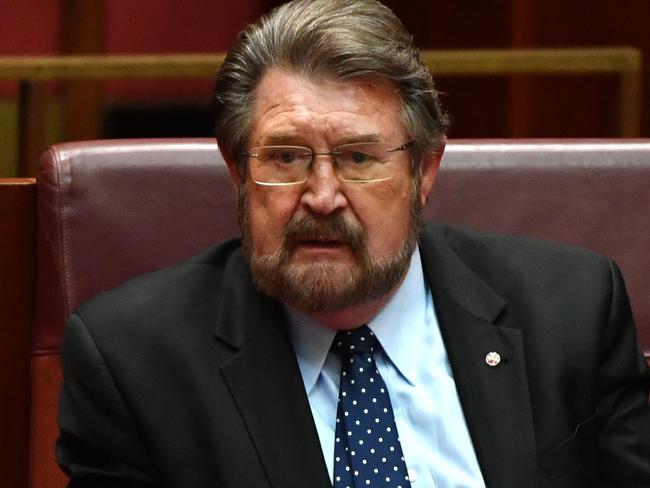Annika Smethurst: When 70 per cent isn’t a pass mark for Turnbull’s business tax cuts
WHEN Derryn Hinch entered Parliament two years ago he was offered some sound advice by Mathias Cormann: “70 per cent of something is better that 100 per cent of nothing.” It was meant to be a lesson in expectations management, Annika Smethurst writes.
Opinion
Don't miss out on the headlines from Opinion. Followed categories will be added to My News.
WHEN Derryn Hinch entered Parliament two years ago he was offered some sound advice by Mathias Cormann: “70 per cent of something is better that 100 per cent of nothing.”
It was meant to be a lesson in expectations management. To demonstrate the gap between what Hinch wanted to achieve and what might be possible as an independent member of the crossbench.
A fortnight ago, Hinch and Cormann dined together in Canberra and Hinch took great delight in reciting that advice back at the Finance Minister and Malcolm Turnbull’s chief negotiator as they sparred over the government’s proposed corporate tax cuts.
Hinch is refusing to back the remainder of the company tax cut package, which will reduce the rate from 30 per cent to 25 per cent for all companies by 2026-27.
Instead, Hinch will support lowering the rate to all companies with a turnover of $500 million or less, effectively excluding the embattled banks.

Hinch, a former radio shock jock, considers himself in touch with the mood of the public. Despite polls to the contrary, he insists it would be “political suicide” for the government — and him — to give the banks a tax cut given the revelations coming out of the banking royal commission.
He believes his $500 million cap breaths new life into the government’s stalled measure.
But Cormann won’t budge. “This would be bad policy as it would be a disincentive for businesses to grow beyond that cap,” he said last week.
Cormann’s refusal to buckle to Hinch is reminiscent of the hard-headed approach the government took when dealing with the crossbench under former prime minister Tony Abbott. Instead of wining and dining the crossbench — as Julia Gillard had done — Abbott called for constitutional changes to limit its power to block bills.

Instead of negotiating amendments on controversial policies in his first budget, Abbott branded the crossbench “feral”.
His apparent political purism lead to a legislative paralysis and his government passed fewer bills in its first 700 days than any other federal government in half a century.
Under Malcolm Turnbull, the government has had more luck negotiating with the Senate — until now.
With marginalised One Nation senator Brian Burston offering his support for the government’s $35.6 billion company tax cuts, Cormann has locked in four of the eight crossbench votes he needs to pass the full company tax cut.
But the final four remain out of reach.
With Hinch standing firm, the government needs to woo four of the five remaining senators — Centre Alliance’s Stirling Griff and Rex Patrick, One Nation’s Pauline Hanson and Peter Georgiou or independent Tim Storer — in order to deliver on its tax promise.
The common view is that the government cannot afford to walk away from the full corporate tax cut package which has been at the centre of its economic policy since the Coalition won a second term.
The government has also made it clear that it is unwilling to make further concessions which could deliver tax cuts to more businesses, sooner.
Labor will also use any move by the government to alter its plan as an admission of defeat and an endorsement of Labor’s economic policy.
The timing of the debate, which coincides with the banking royal commission, is also an unfortunate collision for the government but should have been flagged as problematic.
The government has given itself little choice but to stick to its guns and take the tax cuts to the election.
